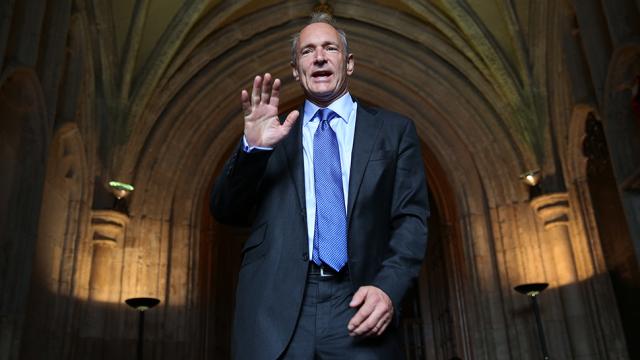Photo: Getty
Yesterday was the 28th anniversary of the day that Tim Berners-Lee submitted his proposal for what would become the World Wide Web. In honour of the occasion, he published a letter outlining the biggest areas of its development that are doing him a frighten and warping his original vision.
Berners-Lee still directs the World Wide Web Consortium which develops open standards for the web. That gives him a tremendous amount of influence. But now that the web truly is world wide, governments and multi-billion dollar corporations hold most of the power. While a lot of the problems he points out aren’t at all new, he says that he’s become “increasingly worried about three new trends” over the last 12 months.
Things that Tim is worried about:
1. The loss of control over personal data
Berners-Lee acknowledges the problem that we all have come to accept the labyrinthine terms of service that come with the private technologies that we use. This has also become an issue with government surveillance, which is collecting data and monitoring communications without asking for personal permission. Berners-Lee fears that data collection by governments is having a chilling effect on what we feel comfortable discussing online.
2. It’s too easy for misinformation to spread on the web
Fake news! Yes, like all of us, Berners-Lee is confounded with the problem of online communication and social bubbles creating a ripe landscape for false information. Specifically “the use of data science and armies of bots” to game the system.
3. Political advertising online needs transparency and understanding
He worries about the ability of politicians to craft multiple narratives for specific groups and no one understanding what the politicians true message is. “Targeted advertising allows a campaign to say completely different, possibly conflicting things to different groups. Is that democratic,” Berners-Lee asks.
Those are some real problems, indeed. They have all been part of a heated discussion. But what do we do about them? Tim’s not totally sure either but at least he does us the service of outlining some vague solutions that he’s leaning towards.
Things that Tim thinks we could do to solve the problems:
1. “Data pods” might be one way to give people more control over their personal information. Berners-Lee has been working with MIT and the Qatar Computing Research Institute on one such project called “Solid” (social linked data). While it’s still in the early stages of development, the idea of Solid is to keep personal data siloed from the corporations that profit from it. Theoretically It would give users greater control over allowing companies like Facebook access to their information and also the ability to revoke access to that information. It would also make it easier to move social data from one application to another, minimising “vendor lock-in.”
2. Subscriptions and micropayments as a solution for publications and other ad-driven businesses. The idea seemingly being to disconnect the gold rush for traffic and the use of personal data for targeted marketing.
3. Fighting government overreach through the courts, if necessary. (hint: it is and will forever be necessary.)
4. Push gatekeepers like Facebook and Google to “continue their efforts” to fight fake news without forming centralised determination of what is or isn’t true.
5. Greater transparency in the ways that algorithms are being used to influence our lives. He cites the Fairness, Accountability, and Transparency in Machine Learning set of principles as an example of how new standards could be determined.
6. Increased regulation of political campaign ads online to bring them up to the same standards required for other mediums like television and radio.
[referenced url=”https://gizmodo.com.au/2016/08/all-of-the-creepy-things-facebook-knows-about-you/” thumb=”https://i.kinja-img.com/gawker-media/image/upload/t_ku-large/z9klahggwkzziiqvbt77.jpg” title=”All Of The Creepy Things Facebook Knows About You” excerpt=”Facebook knows more about your personal life than you probably realise. As part of the company’s increasingly aggressive advertising operation, Facebook goes to great lengths to track you across the web. The company compiles a list of personal details about every user that includes major life events and general interests. For years, details have been murky about how exactly the social network targets ads — but the company has finally given us a glimpse into how the secret sauce is made.”]
Unfortunately, its difficult to see how to persuade those with the power to implement these solutions. Governments will do what they want, though continuous legal battles may hold the beast at bay in some countries. And many internet-focused corporations have built their entire business model around having exclusive personal data and using it efficiently.
Berners-Lee doesn’t necessarily seem naive enough to believe these problems will be solved soon and he says he’ll continue to work on the World Web Web foundation’s five-year strategy as a way of finding solutions.
His access to the most powerful players in tech and his general level of influence will likely be his best weapon in the fight. Convincing the titans of tech that they should stick to the philosophy of not being evil is the best hope for keeping the web alive.
